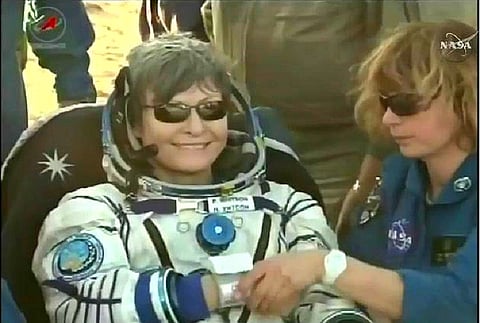

NASA astronaut Peggy Whitson, who holds the record for maximum time spent in space by any American astronaut, safely returned to Earth on Sunday after completing a 288-day mission at the International Space Station.
A Soyuz capsule carrying her and two other International Space Station crew members has safely landed on time in Kazakhstan, according to NASA.
Spotted: #Soyuz space capsule carrying three @Space_Station crew members back home to Earth. Watch landing: https://t.co/mzKW5uDsTi pic.twitter.com/UE3jHr7gCn
— NASA (@NASA) September 3, 2017
Touchdown! @AstroPeggy, @Astro2Fish & Russian crewmate land on Earth after 136 days in space; 288 days for Peggy: https://t.co/mzKW5uDsTi pic.twitter.com/SiylBnuJLG
— NASA (@NASA) September 3, 2017
Russian Fyodor Yurchijin, Americans Jack Fischer and Peggy, members of 52nd expedition to the ISS, landed at 7.21am, near a remote area in Dzhezkazgan.
Minutes after the spacecraft landed, the three astronauts underwent routine medical check-ups.
While Fischer and Yurchikhin both spent 136 days aboard the ISS, Whitson accrued a total of 665 days in space over the course of her career, more than any American astronaut, placing her eighth on the all-time space endurance list, NASA said.
Whitson launched on November 17 with 377 days in space already under her belt, and on April 24 broke Jeff Williams' standing US record of 534 cumulative days in space.
Yurchikhin returned to Earth with a total of 673 days in space on his five flights, putting him in seventh place on the all-time endurance list.
At the time of undocking, Expedition 53 will begin aboard the station under the command of Randy Bresnik.
Half of our complement of crew @Space_Station departed today. Godspeed Argo and your crew, may you have a soft landing! pic.twitter.com/pIPT7gkXJX
— Randy Bresnik (@AstroKomrade) September 3, 2017
Russian cosmonaut Sergey Riazanski (Roscosmos), American Randolph Bresnik (NASA) and Italian Paolo Nespoli (European Space Agency), remain on the ISS, to be joined by three others - Mark Vande Hei and Joe Acaba of NASA and Alexander Misurkin of Roscosmos - on September 12 from Baikonur, Kazakhstan.
The ISS, a 16-nation project representing an investment of more than $150 billion, currently comprises 14 permanent modules and orbits the Earth at a speed of more than 27,000 kph.